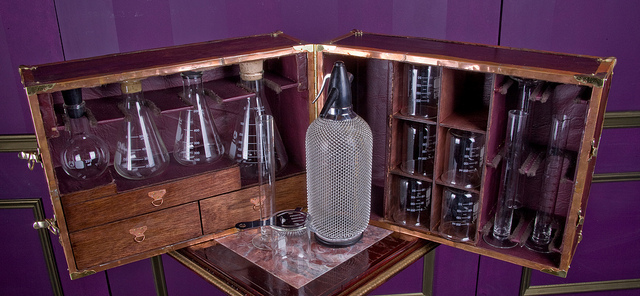 Photo courtesy of Steampunk Family the von Hedwigs
Photo courtesy of Steampunk Family the von Hedwigs
Cocktails in the lab? Normally I wouldn’t recommend it. But sometimes a good cocktail is what you need to get the job done right.
When you lyse cells – either by adding detergents or by physically disrupting the cells, not only do you release your protein, but you also release a variety of other proteins that can be harmful to your protein.
Proteases, those darn protein-nibbling enzymes, can degrade your protein leaving you with multiple short peptides. The consequences for your Western blot are a blank blot if the antibody epitope was destroyed because the protein is chewed up beyond recognition (the horror), or a blot with smaller band(s) than you anticipated (leaving you with a fun game of identify the band).
There are several things you can do to foil proteases. We’ve already covered how to keep your samples cold to prevent degradation. In this post, we are going to talk about chemical additives you can use to inhibit protease action.
What is a protease inhibitor?
An important chemical tool for preventing protein degradation is protease inhibitors. They are easily purchased and added to your lysis solution, BUT, and this is a big but, no single protease inhibitor will inactivate every protease. Therefore, most people add a “cocktail” of protease inhibitors into the mix. You can make the cocktail yourself, or you can purchase a pre-made one from many companies.
Making your own protease inhibitor cocktail
To make your own cocktail, you need to add a mixture of protease inhibitors with different targets. Below is some information about common protease inhibitors to help you out when making your own drink cocktail.
Aprotinin
Aprotinin is a bovine pancreatic trypsin inhibitor that inhibits serine proteases, like trypsin, chymotrypsin and plasmin. Aprotinin is a reversible inhibitor. Make stock solutions of aprotinin in water (5 mg/mL) and store at 4°C for up to one week. A good working concentration is 1-2 µg/mL.
Leupeptin
Found in Actinomycetes, leupeptin reversibly inhibits cysteine, serine and threonine proteases, such as trypsin, plasmin, papain, cathepsin B, and kallikrein. However it does not inhibit pepsin, cathepsins A and D, elastase, renin or chymotrypsin. Leupeptin is soluble in water, ethanol and acetic acid. Store stock solutions (50 mg/mL) at -20°C and use at 1-2 µg/mL.
Pepstatin A
Pepstatin A inhibits aspartylproteases, such as pepsin, and cathepsins D and E. It is insoluble in water, but stock solutions can be made in a variety of alcohols and acetic acid (e.g. 1 mg/mL in methanol) and stored at -20°C. Working concentration (1 µM) is stable for one day at room temperature.
PMSF
Phenylmethanesulfonyl fluoride (PMSF) is an irreversible inhibitor of several serine proteases, namely trypsin, chymotrypsin and thrombin. It can also inhibit some cysteine proteases, metalloproteases and aspartic proteases. Be careful: PMSF is rapidly degraded in water. Make the stock solution in an anhydrous liquid such as ethanol (200 mM) , store at 4°C and add to your lysis buffer just before use (final concentration 0.1-1mM).
TLCK
Na-Tosyl-Lys-chloromethylketone (whew!) is another irreversible serine protease inhibitor. It has demonstrable activity against trypsin, granzyme D, tryptase, plasmin, thrombin and papain. TLCK is soluble in aqueous solutions, but is highly unstable in buffers with a pH higher than 6.0. Stock solutions can be made in methanol (50 mg/mL) or in solutions with a pH < 6.0 (10 mM). Use at 10-100 µM final concentration.
Chelating agents
Metalloproteases are inactivated in the presence of chelating agents. Use 1-10 mM solutions of EDTA and EGTA to inhibit proteases.
Commercially available protease inhibitor cocktails
Many companies sell protease inhibitor cocktails. They are convenient, easy to use, and can be less expensive than purchasing individual inhibitors (depending on how much you need). Some are even optimized by application (i.e. different cocktails for bacterial, mammalian or plant cell lysis).
If you are thinking about making your own cocktail but are flummoxed by the choice of inhibitors, some companies are generous enough to provide the list of inhibitors in their cocktails. You could probably replicate it (hint, hint).
Whether you choose to make your own cocktail or buy a pre-made one, remember – it’s 5 o’clock somewhere.
- Bacterial cells
- Mammalian tissues
- Plant cells
- HIS-tagged proteins
– See more at: https://www.sigmaaldrich.com/life-science/molecular-biology/molecular-biology-products.html?TablePage=14562002#sthash.9idBzzxw.dpuf
- Bacterial cells
- Mammalian tissues
- Plant cells
- HIS-tagged proteins
– See more at: https://www.sigmaaldrich.com/life-science/molecular-biology/molecular-biology-products.html?TablePage=14562002#sthash.9idBzzxw.dpuf

Leave a Reply